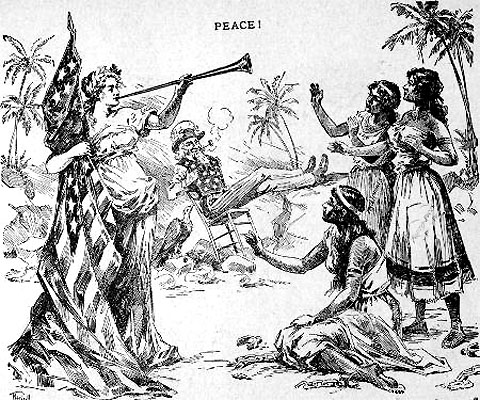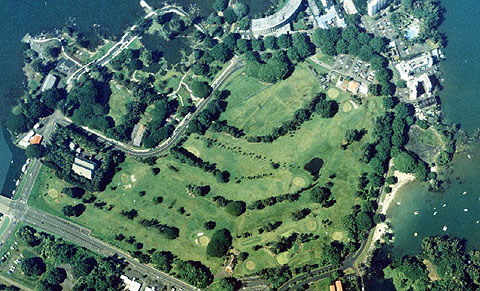by Lanny Sankin on 2 February 2008
This decision by the Hawai'i Supreme Court is extraordinary and will set in motion the final stages of the restoration of the Hawaiian nation. To read the decision, you can go to the Hawai'i Supreme Court web site, select the Opinions tab, select the link to "January 2008," and scroll to 01/31/08 to find the case with "Office of Hawaiian Affairs" in the caption.
The Court basically said that the Apology Resolution is the law. That means that each section of the resolution is to be read as defining where we go from here. The overthrow was illegal. The Hawaiians never gave up their sovereignty. Their land was taken without permission or compensation. The land is held in trust by the State of Hawai'i until such time as the reconciliation process called for in the resolution is completed. The link between the Hawaiian people
and the land is recognized as fundamental to their civilization.
I encourage you to read the opinion so that you watch events unfold from an informed perspective.
Of course, Mr. Impeachable -- Attorney General Mark Bennett -- disagrees with the court. One can only wonder if he will now proceed to act in defiance of the court ruling, like he did in the Superferry episode.
Court bars state from selling ceded land
by Dan Nakaso on 1 February 2008 in The Honolulu Advertiser
The state cannot sell or transfer the 1.8 million acres of former Hawaiian monarchy lands, known as ceded lands, until the claims of Native Hawaiians to the property have been resolved, the Hawai'i Supreme Court ruled yesterday.
The Supreme Court ruling was a victory for the Office of Hawaiian Affairs.
Sherry Broder, one of the attorneys who argued the case on behalf of OHA, called the ruling "a tremendous victory for the Hawaiian people. I'm very excited about it."
The decision was a defeat for the state, which argued it had the right to sell ceded lands.
"We're disappointed with the decision," state Attorney General Mark Bennett said last night. "It is our belief that the state is and should be able legally to sell ceded lands. ... We think it's legal."
In the case of OHA vs. the Housing and Community Development Corporation of Hawai'i and the state of Hawai'i, the Supreme Court reversed an earlier Circuit Court judgment in favor of HCDCA and the state and ordered the lower court to bar the sale or transfer of ceded lands.
The court's decision cited 1.8 million acres of historical ceded lands. Broder said the amount was 1.4 million acres.
The case began in the mid-1990s when the state transferred parcels of ceded lands to private entrepreneurs on Maui and the Big Island for residential development. In 1995, OHA sought an injunction for the Maui and Big Island parcels, as well as any other ceded lands from the public lands trust.
The Supreme Court's decision yesterday cited generations of critical moments in Hawaiian history, dating to the 1893 overthrow of the Kingdom of Hawai'i and the surrender of crown, government and public lands to the United States; the admission of Hawai'i as a state; the creation of OHA and the public lands trust; and Congress' 1993 Apology Resolution 100 years after the overthrow.
"In our view," the justices held, "the Apology Resolution acknowledges only that unrelinquished claims (by Native Hawaiians) exist and plainly contemplates future reconciliation with the United States and the state with regard to those claims."
The court held that the Apology Resolution and related state legislation "give rise to the state's fiduciary duty to preserve the corpus of the public lands trust, specifically, the ceded lands, until such time as the unrelinquished claims of the Native Hawaiians have been resolved."
Bennett, the attorney general, and his staff were reviewing the 93-page decision last night and he said it was premature to comment on whether the state may appeal.
RENEWED FOCUS ON BILL
Various entities have been awaiting the court's ruling, Bennett said, but he was not immediately aware of any potential third party land transactions that might be affected.
"We'll have to take a better look at the facts to see what the immediate impact will be," Bennett said.
Bennett said, "We respectfully disagree with the Hawai'i Supreme Court that the Apology Resolution is any way relevant to the question of whether the state has a legal right to sell ... ceded lands. We believe and argued that the law clearly allowed the state to sell ceded lands. That was the contemplation of Congress when it passed the Admissions Act."
The Supreme Court's order for an injunction to bar the sale of the land until claims are resolved places new focus on the stalled Akaka bill in Congress, which could create a third party to resolve claims on the ceded lands, Broder said.
"The next step is having the creation of a Native Hawaiian entity to negotiate with the federal and state governments for the unrelinquished claims for the Hawaiian people," Broder said. "The court is keeping the corpus of the ceded lands intact until any claims can be resolved."
A STOPGAP MEASURE
In its ruling yesterday, the Supreme Court noted that OHA specifically asserted that it is not asking to resolve any claims to ceded lands "but only to protect the trust assets that are in dispute by issuing an injunction barring the sale or transfer of the (ceded) lands."
The court found that OHA merely wanted the court to protect the lands "until the political branches can reach a just solution to this dispute. In fact, the OHA plaintiffs admit that 'the ultimate resolution of the Native Hawaiian claims must be through the political processes, and it is actively engaged in these processes. But this struggle for justice will be futile if the assets in disputes (i.e., the ceded lands) no longer exist when a solution is
found.' "
OHA issued a statement last night saying it "is pleased with the favorable opinion by the Hawai'i State Supreme Court in a case with important implications."
|
State and OHA make land deal
by Richard Borreca on 19 January 2008 in The Star Bulletin
The state has agreed to resolve a 30-year-old dispute with the Office of Hawaiian Affairs over so-called ceded lands by turning over $200 million in cash and land.
State land along Kewalo Basin and at Kalaeloa on Oahu and on Banyan Drive on the Big Island will be given to OHA, according to the agreement that state officials are calling historic. The land is valued at about $187 million.
The dispute traces its roots to 1978 when Hawaii voters approved changes to the state Constitution that created OHA, calling for the state to give OHA revenues from ceded lands -- land controlled by the state of Hawaii that was originally under the control of the kingdom of Hawaii.
The agreement must be approved by the Legislature.
Officials at a news conference in Gov. Linda Lingle's executive office at the state Capitol said yesterday that three state administrations, those of Govs. Waihee, Cayetano and Lingle, have tried to put together a deal to pay OHA for the lands.
"The payments to OHA resulted in being a football that was kicked from the Legislature to the courts back to the Legislature with little to limited success," Haunani Apoliona, OHA chairwoman, said yesterday.
The new agreement gives OHA $13 million now and guarantees an annual state payment of $15 million.
Also, OHA is given title of some closely watched waterfront property, the Ewa portion of Kewalo Basin that was controversial two years ago when a state-sponsored plan would have put up condominiums on the property in return for putting other parcels into park use.
Now the Hawaii Community Development Authority has formed a community group to reach consensus on how to develop the area. The parcel would still be under the jurisdiction of HCDA. Lingle said yesterday the agreement proposes that an additional person be added to the HCDA board and that the person be nominated by OHA.
The entire agreement must now be approved by the Legislature, and it is expected to be controversial.
Big Island Sen. Lorraine Inouye, whose Hilo district abuts the 80 acres of resort-zoned land at Banyan Drive that would go to OHA, predicted some discussion.
"I think resolving the issue is long overdue, but some may not be happy with it," Inouye (D, Hilo-Hamakua) said.
Apoliona called the agreement "momentous."
"Some native Hawaiians will think it is not enough, but there are those in the native Hawaiian community saying, 'Yeah, great move,'" Apoliona said.
Senate President Colleen Hanabusa said the Legislature will have to hold hearings to find out what the Hawaiian beneficiaries think.
"I feel we are going to be the receivers of a lot of frustrations and anxiety," Hanabusa said.
Jonathan Scheuer, OHA land management director, said the state controls more than 10,000 individual parcels of land worth more than a billion dollars. OHA and the state reviewed the various parcels and agreed on the three areas.
"We want to ensure that the land is developed in a culturally sound way that can produce outstanding revenues that can be put into beneficiary programs," Scheuer said.
The Hilo property, Scheuer said, represents 80 percent of the resort property in East Hawaii. While there are existing leases with hotel owners now, OHA wants to look at the entire package for future development.
|
|

